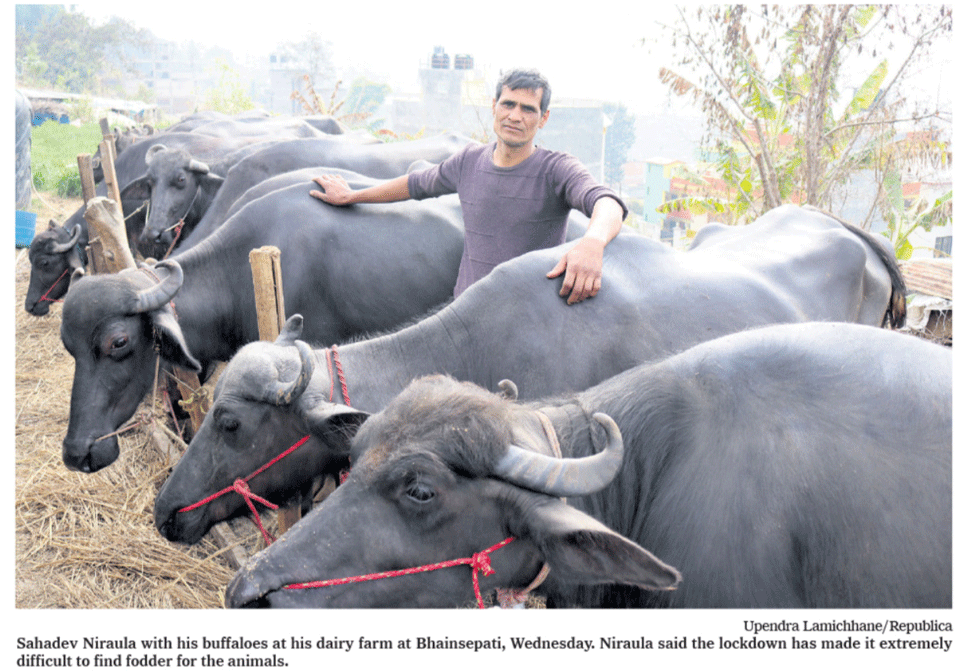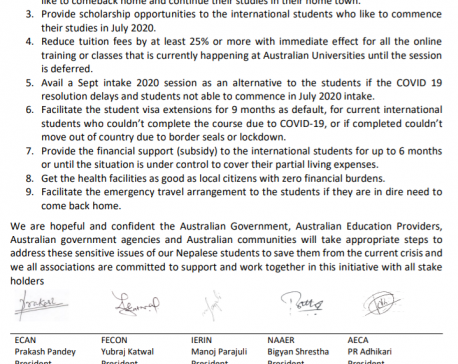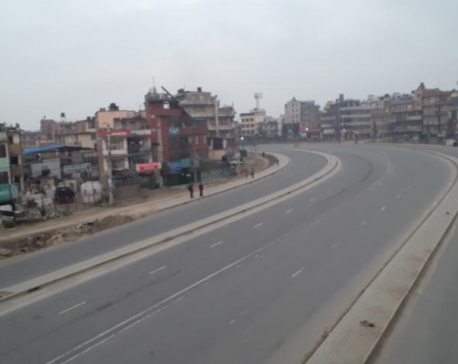
OR
Lockdown leaves some dairy farmers without fodder
Published On: April 9, 2020 10:13 AM NPT By: Upendra Lamichhane

LALITPUR, April 9: Sahadev Niraula, 48, says he was never this upset in his life. When Republica telephoned him on Wednesday morning, he said he was bringing fodder in his bike from Khokana of Lalitpur. If he fails to manage enough of it on time, his cattle may die, he said.
Originally from Bajhang district, Niraula resides in Bhaisepati where he has been keeping buffaloes and cows for the past five years. He sells the milk. His business has only thrived over the years despite a few challenges along the way. However, this time, things look rather grim him, he says.
As the novel coronavirus continues to wreak havoc across the world and many countries including Nepal imposing total lockdowns, farmers like Niraula are among the hardest hit. With the nationwide lockdown already into a third week, he has run out of his stock of fodder and grass and has been scouring the Valley's outskirts for fodder offering farmers more than the normal price. But nobody likes to entertain him citing the coronavirus lockdown. "Why have you come here breaching the lockdown? You should stay at home," they scold him. "But if I return home without grass, my buffaloes and calves will starve to death," lamented Niruala.
He has 13 buffaloes, and a few cows and calves. A little amount of fodder or grass won't be enough to feed them all but he does not know where to find fodder during lockdown.
Before the lockdown, big trucks would bring fodder from the tarai for his animals.
"After this lockdown, the supply has stopped and I don't know how to find fodder," he bemoaned.
He wonders why the government forgot to include animal feed and fodder in the list of essential items.
"Why only human food? Shouldn't animal feed also be listed under essential items? he questions.
Until a few decades ago, many people would traditionally raise dairy cattle in Kathmandu Valley. But nobody wants cattle these days even on the Valley's outskirts. Very few people rear dairy animals. Niraula is quite sought after in his area, Bhainsepati, as he supplies 'pure milk' and other fresh dairy products to the locals. He sells over 200 liters of milk daily and 'the income is awesome'. "Per month, I make around Rs 300,000 and after deducting all costs, half the amount is profit," he reported.
There is another dairy farmer in the area - Nandaraj Pandey. He is no less worried about the lack of the feed for his cattle. "I have 11 buffaloes and four cows. There is no fodder for them anymore," he said. "We want the government to do something about it," he said.
They say, they don't want cash from the government but anything that ensures the survival of their animals.
Meanwhile, Niraula said farmers like him pay taxes to the government. In return, the government must be sensitive toward their problems. "It's indeed a challenging time for the country. I hope that the government must be doing something about us," he said. "But they should do it quickly otherwise we cannot sustain our business," he added.
On March 31, the Ministry of Agriculture and Livestock had issued a statement urging all local bodies to facilitate the production and supply of fodder. According to the spokesperson of the ministry Hari Bahadur KC, farmers who have been hit hard will receive relief from the government. "We are collecting details of farmers hit by the lockdown. They will receive relief as per the losses they have borne," he said.
You May Like This

Seven girls contactless after leaving home for fodder
A police team has left for the Sitamarhi Railway Station of India where the teenagers were spotted ... Read More...

Help and support Nepali students in Australia on current COVID-19 crisis
A collective representative of five big umbrella organizations of education consultancies working for Nepali student community in Nepal and Australia... Read More...

Weeklong nationwide lockdown from today
KATHMANDU, March 24: Hours after the government confirmed second case of coronavirus in the country on Monday, it took an extraordinary... Read More...







Just In
- NRB to provide collateral-free loans to foreign employment seekers
- NEB to publish Grade 12 results next week
- Body handover begins; Relatives remain dissatisfied with insurance, compensation amount
- NC defers its plan to join Koshi govt
- NRB to review microfinance loan interest rate
- 134 dead in floods and landslides since onset of monsoon this year
- Mahakali Irrigation Project sees only 22 percent physical progress in 18 years
- Singapore now holds world's most powerful passport; Nepal stays at 98th











Leave A Comment